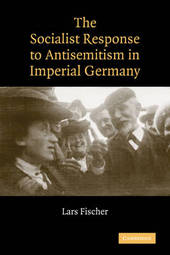
|
The Socialist Response to Antisemitism in Imperial Germany
Paperback / softback
Main Details
| Title |
The Socialist Response to Antisemitism in Imperial Germany
|
| Authors and Contributors |
By (author) Lars Fischer
|
| Physical Properties |
| Format:Paperback / softback | | Pages:276 | | Dimensions(mm): Height 229,Width 152 |
|
| ISBN/Barcode |
9780521153249
|
| Classifications | Dewey:943.004924 |
|---|
| Audience | | Professional & Vocational | |
|---|
| Illustrations |
Worked examples or Exercises
|
|
Publishing Details |
| Publisher |
Cambridge University Press
|
| Imprint |
Cambridge University Press
|
| Publication Date |
10 June 2010 |
| Publication Country |
United Kingdom
|
Description
What set antisemites apart from anti-antisemites in Imperial Germany was not so much what they thought about 'the Jews', but what they thought should be done about them. Like most anti-antisemites, German Social Democrats felt that the antisemites had a point but took matters too far. In fact, Socialist anti-antisemitism often did not hinge on the antisemites' anti-Jewish orientation at all. Even when it did, the Socialists' arguments generally did more to consolidate than subvert generally accepted notions regarding 'the Jews'. By focusing on a broader set of perceptions accepted by both antisemites and anti-antisemites and drawing a variety of new sources into the debate, this study offers a startling reinterpretation of seemingly well-rehearsed issues, including the influence of Karl Marx's Zur Judenfrage, and the positions of various leading Social Democrats (Franz Mehring, Eduard Bernstein, August Bebel, Wilhelm Liebknecht, Karl Kautsky, Rosa Luxemburg) and their peers.
Reviews'Fischer here brings a sharp and unrelenting gaze to the classic texts that define the Jewish Question for German socialists. His meticulous analysis leaves little doubt in the reader that they were much more a part of the problem than a part of the solution.' Richard S. Levy, University of Illinois, Chicago 'Fischer's work is interesting, original, and persuasively argued. It is based on an exceptionally close and careful reading of texts, and makes a significant contribution to our understanding of an important, and still controversial, subject.' Jack Jacobs, City University of New York 'Fischer's work is an ambitious undertaking ... Fischer's analysis is built, for the most part, on perceptive and persuasive close readings of various socialist texts.' Barnet Hartston, H-German 'Fischer manages to portray a highly theoretical issue in the realm of social and intellectual history with clarity. His study convinces due to its close reading of sources, persuasive argument, and comprehensive knowledge of his field of research. Fischer makes a compelling case for his occasionally provocative theses.' Salvador Oberhaus, Sehepunkte 'In his important study, Lars Fischer offers a significant contribution to the ever-growing debate concerning the presence of antisemitism in German society prior to the Holocaust.' Kevin P. Spicer, American Historical Review '... methodologically innovative and offers important revisions of the established readings of a set of emblematic texts.' Marcel Stoetzler, German Studies Review 'Lars Fischer has written an engaging and challenging book.' Albert S. Lindemann, Journal of Modern History 'Lars Fischer has written an illuminating book ... specialists in German Jewish history and historians of anti-semitism will certainly welcome the monograph.' Keith H. Pickus, Social History 'Fischer's book brings to light new information and it is marked by very smart analysis ...' Peter Jelavich, The Jewish Quarterly Review '... a very welcome contribution to the vital, still haunting, and unresolved legacy within socialism.' Nils Roemer, The Historian '... Fischer develops an analytic approach that is exceptionally well suited to his exploration of political culture. This, along with his nimble use of indirect evidence to transform the possible into the likely, makes [his] approach extraordinarily refreshing ... The Socialist Response to Antisemitism [in Imperial Germany] represents a landmark in the art of teasing meaning out of recalcitrant sources that is well worth emulating.' Jonathan R. Zatlin, Central European History
|